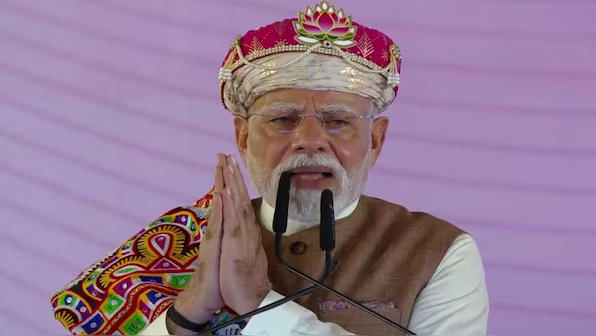New India’s Bold Stand: PM Modi’s 75th Birthday Address Blends Security, Development, and Swadeshi Vision
- MGMMTeam

- Sep 18, 2025
- 4 min read
Prime Minister Narendra Modi marked his 75th birthday with a powerful address in Dhar, Madhya Pradesh, where he combined uncompromising national security messaging with ambitious social and economic initiatives. The speech underscored a confident “New India” that is ready to defend its sovereignty while simultaneously laying foundations for industrial growth and welfare-driven development.

A Defiant Stand on Security and Terrorism
In one of the most striking parts of his speech, Modiji declared that India is no longer intimidated by nuclear threats from hostile neighbours. Referring to Operation Sindoor, launched after a terrorist assault that targeted Indian women, he recounted how India swiftly destroyed terror camps across the border and restored dignity “in the blink of an eye.” By highlighting this operation and Pakistan’s subsequent admission of losses, Modiji reinforced the message that India will not hesitate to strike back—even inside enemy territory—if provoked.
The prime minister framed this as a defining characteristic of “New India,” where deterrence is coupled with decisive action, projecting strength at a time when regional security challenges remain high.
The Launch of PM MITRA Park in Dhar
Alongside his security message, Modiji unveiled the PM MITRA Park in Dhar, the first of seven such parks under a nationwide scheme to transform India’s textile sector. Spread across more than 2,000 acres, the park will host integrated facilities ranging from fibre processing to garment manufacturing, with modern infrastructure such as solar power, common effluent treatment plants, housing, and social amenities for workers.
By locating this park in Madhya Pradesh, the government aims not only to strengthen India’s textile exports but also to create thousands of local jobs, especially for youth and women. The project is part of a larger vision to make India a global textile hub, reduce logistical costs, and ensure fair returns to cotton farmers.
Social Welfare and Women’s Health Initiatives
The speech also spotlighted social empowerment programs, particularly for women and tribal communities. Modiji announced the “Swasth Nari Sashakt Parivar” campaign, designed to improve women’s health through free screenings and treatment for conditions like anaemia, TB, diabetes, and cancer. Linked to the Ayushman Bharat scheme, the campaign will run until Vijayadashami, aiming to reach women across rural and tribal belts.
The prime minister further emphasized efforts to eradicate sickle cell anaemia in tribal regions and highlighted how welfare initiatives—from free LPG cylinders under Ujjwala Yojana to toilets under Swachh Bharat and direct cash transfers—have been designed with women’s empowerment at their core. By focusing on health, financial independence, and dignity, Modiji positioned women as central to India’s progress.
Cultural Heritage, National Pride, and Swadeshi Appeal
Modiji also infused his speech with cultural symbolism and historical pride. He paid tribute to Dhar’s legendary rulers and sages while commemorating Hyderabad Liberation Day, a milestone in India’s integration led by Sardar Vallabhbhai Patel. By recalling such legacies, he linked past struggles with the present vision of national unity.
Equally important was his call for a Swadeshi resurgence. Modiji urged citizens to buy Made-in-India goods during the upcoming festive season, stressing that every purchase contributes to the goal of a self-reliant India by 2047. Traders and consumers alike were reminded that supporting domestic industries is not just economic activity but a patriotic duty aligned with India’s developmental journey.
The Larger Significance
The speech reflected a careful balancing act between strength and compassion—assertive foreign policy on one hand, and welfare-driven governance on the other. By combining military resolve, industrial development, and social welfare, Modiji projected himself as both the defender of national security and the architect of grassroots empowerment.
The PM MITRA Park represents a tangible step in India’s industrial transformation, while the women’s health campaign symbolizes a softer, people-centric side of governance. Together, these initiatives align with Modiji’s broader narrative of building a confident, resilient, and self-reliant India.
The MGMM Outlook
Prime Minister Narendra Modi’s 75th birthday address in Dhar was not just a celebration but a declaration of New India’s rising confidence. His words reflected the spirit of a nation that refuses to bow to external threats and instead answers with decisive strength, as seen in his reference to Operation Sindoor. By openly declaring that India is no longer afraid of nuclear blackmail, Modiji sent a clear message to hostile neighbours: the era of hesitation is over, and India will strike back if its sovereignty is challenged. This defiance, blended with the remembrance of national heroes and Hyderabad Liberation Day, showcased a leadership that draws strength from history while shaping the future.
Yet, Modiji’s vision stretched beyond security. The unveiling of the PM MITRA Park in Dhar signalled a major step toward industrial transformation, promising jobs, global competitiveness, and prosperity for farmers and youth. Equally, the focus on women’s health through the “Swasth Nari Sashakt Parivar” campaign, alongside welfare schemes rooted in dignity and empowerment, reinforced that national strength is incomplete without social progress. By linking Swadeshi pride with economic growth and making women the backbone of empowerment, Modiji’s address framed New India as both powerful and compassionate—a nation walking firmly towards self-reliance by 2047.
(Sources: Firstpost, NDTV, Hindustan Times)




Comments